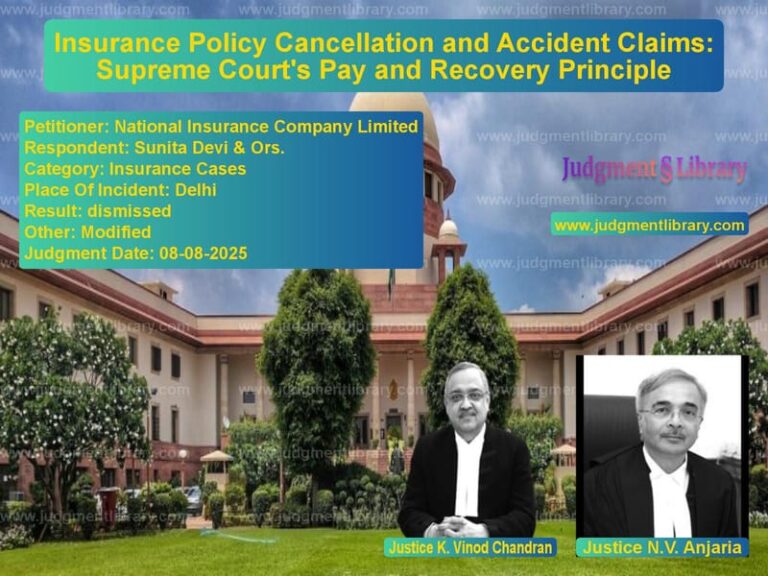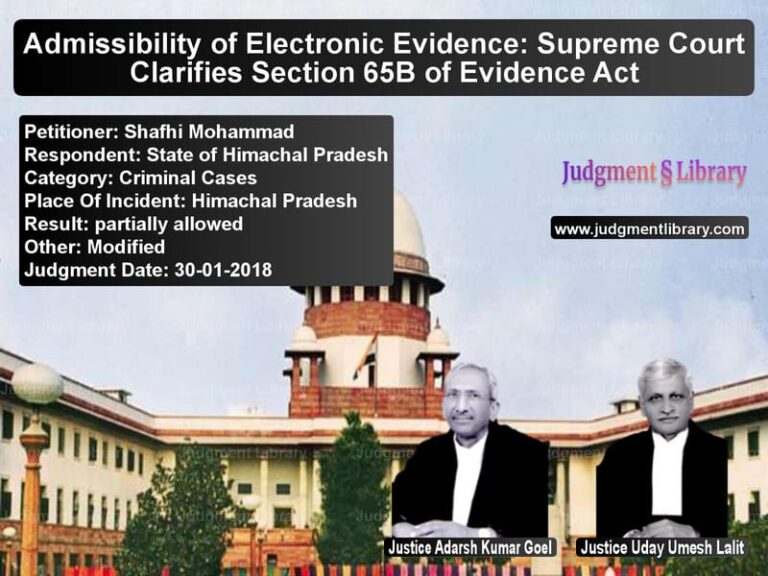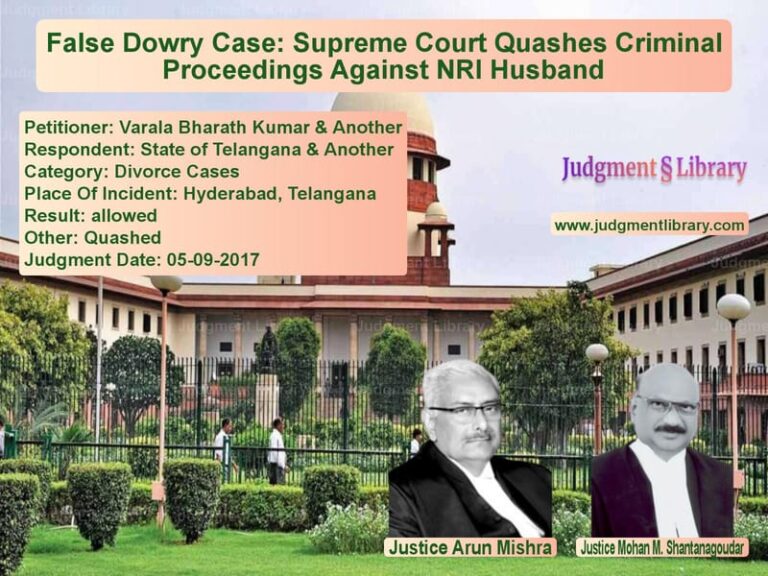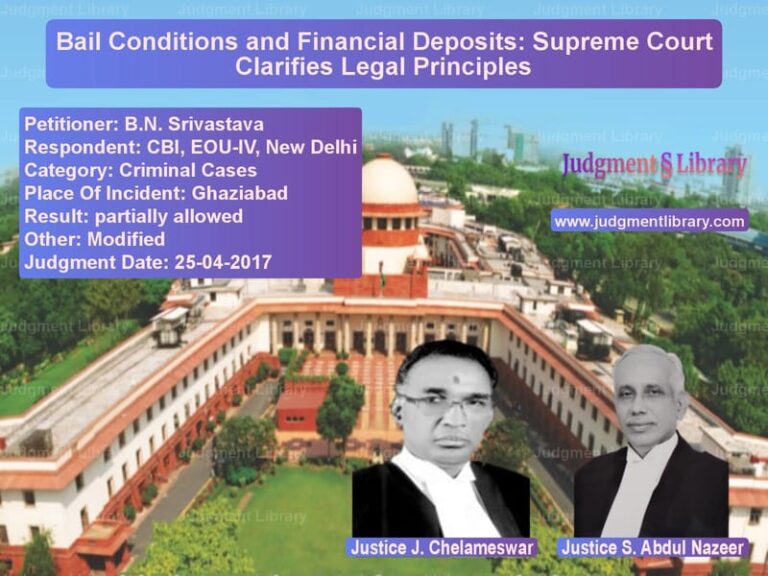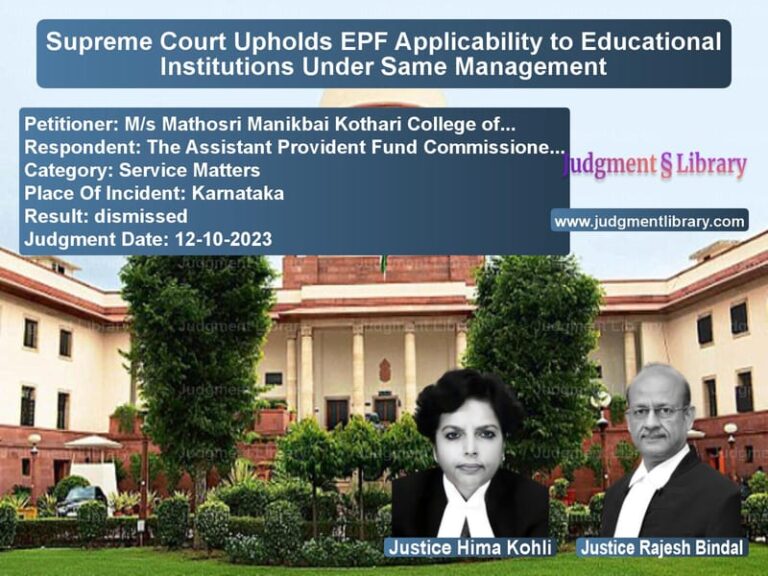Supreme Court Dismisses Appeal in Uttar Pradesh School Management Election Dispute
The Supreme Court of India, in the case of Ramadhar Singh & Others vs. Committee of Management Shri Manas Shiksha Prasar Samiti, Itaili & Others, addressed a long-standing dispute regarding the election of a school management committee. The judgment effectively dismissed the appeal, allowing the existing management committee to continue its term.
The ruling reaffirms the principle that disputes over elections to management committees must be resolved within the tenure of the committee, and if subsequent elections have taken place, earlier disputes become redundant.
Background of the Case
The case revolved around a challenge to the election of the management committee of Shri Manas Shiksha Prasar Samiti, Itaili. The disputed election was held on April 1, 2008. However, by the time the case reached the Supreme Court, further elections had already been conducted in 2011 and 2014, with another election scheduled soon.
The appellants approached the Supreme Court seeking intervention in the dispute, despite multiple election cycles having taken place after the original challenge.
Petitioner’s (Ramadhar Singh & Others) Arguments
- The 2008 election was conducted unfairly, and the court should examine the validity of that election.
- Despite subsequent elections, the procedural irregularities in the 2008 election needed to be addressed.
- The management committee’s legitimacy was questionable due to the alleged illegalities in the election process.
Respondent’s (Committee of Management) Arguments
- The term of the disputed election had already expired, making any ruling on the matter ineffective.
- Fresh elections were held in 2011 and 2014, and the governance structure had changed since then.
- Intervening at this stage would serve no practical purpose as the appellants had not contested the later elections.
Supreme Court’s Ruling
The Supreme Court, in a judgment delivered by Justices Kurian Joseph and Rohinton Fali Nariman, dismissed the appeal on the grounds that it had become irrelevant due to subsequent elections.
1. Election Disputes Must Be Resolved Within the Term of the Committee
The Court emphasized that election disputes must be adjudicated within a reasonable timeframe. Since elections had already taken place in 2011 and 2014, revisiting the 2008 election was unnecessary.
“The disputed election was held on 01.04.2008. It is not in dispute that the term of the Committee is for three years. There were elections in 2011 and 2014 and another election must be getting due as well.”
2. Current Management Committee to Continue
The Court ruled that the management committee in office at the time of the judgment would continue its tenure:
“We make it clear that the elected Committee in office as on today will continue till their term is over.”
3. Pending Civil Suit Also Dismissed
The appellants had also filed a civil suit (O.S. No. 1624 of 2009) before the Civil Judge (Junior Division), Mau, U.P. The Supreme Court noted that the appellants did not wish to press this suit, leading to its dismissal:
“Accordingly, the said suit being O.S. No. 1624 of 2009 on the file of the Civil Court, Mau, U.P. shall stand dismissed and consequently, shall stand struck off from its files.”
4. Questions of Law Left Open
The Court clarified that its ruling was based solely on the facts of this case and did not settle broader legal issues related to election disputes.
“We make it clear that in the nature of the order we have passed, all other questions of law raised in the appeal are left open.”
Final Verdict
The Supreme Court ruled as follows:
- The appeal was dismissed as no substantive issues remained.
- The existing management committee would continue until the end of its tenure.
- The pending civil suit (O.S. No. 1624 of 2009) was struck off from the records of the Civil Court, Mau, U.P.
- No costs were imposed on either party.
Conclusion
This judgment reinforces the principle that election disputes must be resolved in a timely manner, and once subsequent elections have taken place, earlier disputes become moot.
Key Takeaways:
- Election disputes must be resolved within the term of the elected body.
- Once multiple elections have taken place, revisiting earlier disputes serves no practical purpose.
- Civil suits related to past elections can be dismissed if they no longer serve any legal purpose.
- The Supreme Court’s ruling ensures administrative continuity and prevents unnecessary litigation.
This judgment provides clarity on handling disputes related to management committees and serves as a precedent for resolving election-related legal conflicts efficiently.
Don’t miss out on the full details! Download the complete judgment in PDF format below and gain valuable insights instantly!
Download Judgment: Ramadhar Singh & Oth vs Committee of Managem Supreme Court of India Judgment Dated 23-02-2016-1741852816022.pdf
Direct Downlaod Judgment: Direct downlaod this Judgment
See all petitions in Public Interest Litigation
See all petitions in Legislative Powers
See all petitions in Judgment by Kurian Joseph
See all petitions in Judgment by Rohinton Fali Nariman
See all petitions in dismissed
See all petitions in supreme court of India judgments February 2016
See all petitions in 2016 judgments
See all posts in Election and Political Cases Category
See all allowed petitions in Election and Political Cases Category
See all Dismissed petitions in Election and Political Cases Category
See all partially allowed petitions in Election and Political Cases Category



